View from the inside. Postgraduate Studies in EPFL. Part 3: from receipt to protection
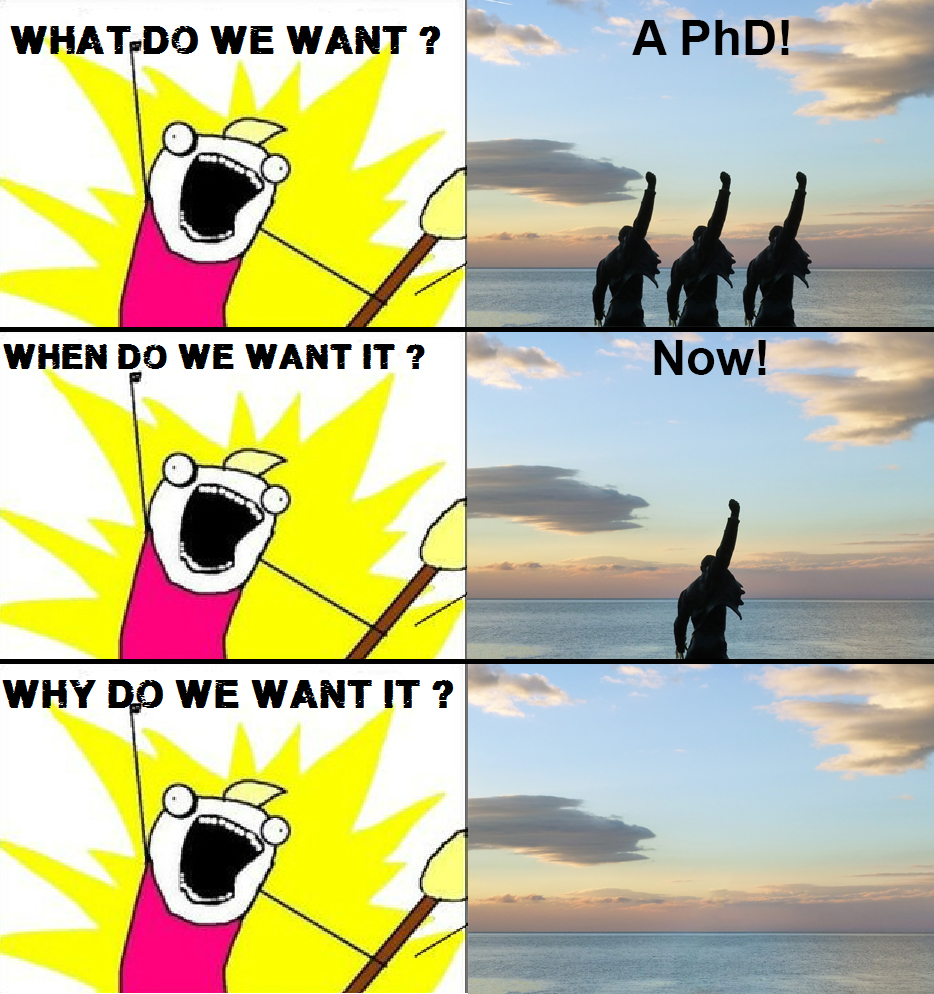 EPFL Dedicated to 50th Anniversary
EPFL Dedicated to 50th AnniversaryOn October 30, 2012, I had a one-way ticket to Geneva, and a great desire to get a Ph.D. degree from one of the most prestigious universities in Europe, and perhaps the world. And on December 31, 2018 I spent my last day in the laboratory to which I had already become attached. It's time to take stock of where dreams have led me over the past 6 years, talk about the peculiarities of life in the country of cheese, chocolate, watches and army knives, as well as philosophize on where to live well.
How to enter graduate school and what to do immediately upon arrival is described in two articles ( part 1 and part 2 ). For the computer science school, I found my rather detailed manual here . In this part, it is time to finish the story about graduate school at a fine university, in one of the richest and at the same time poor country - Switzerland.
')
Disclaimer: the purpose of this article is to set forth in an accessible form the main points of the scientific life of a graduate student in EPFL, perhaps sometime the part of the following thoughts will be embodied in the Russian Federation when reforming universities or in the program 5-100. Spoilers removed additional, disclosing information and examples, perhaps some points are too generalized, but I hope this does not spoil the overall picture of the story.
Well, congratulations to you, my dear friend, you enrolled in graduate school at one of the best universities in Europe and the world, set your everyday life, which we will discuss in more detail in the following sections, passed the necessary safety and laboratory trainings. And now half a year has passed, the head, the professor is immensely pleased (or not - but this is not accurate) with the results, and the candidate exam has begun to loom ahead - the first serious test of the way to obtaining a Ph.D. aka PhD.
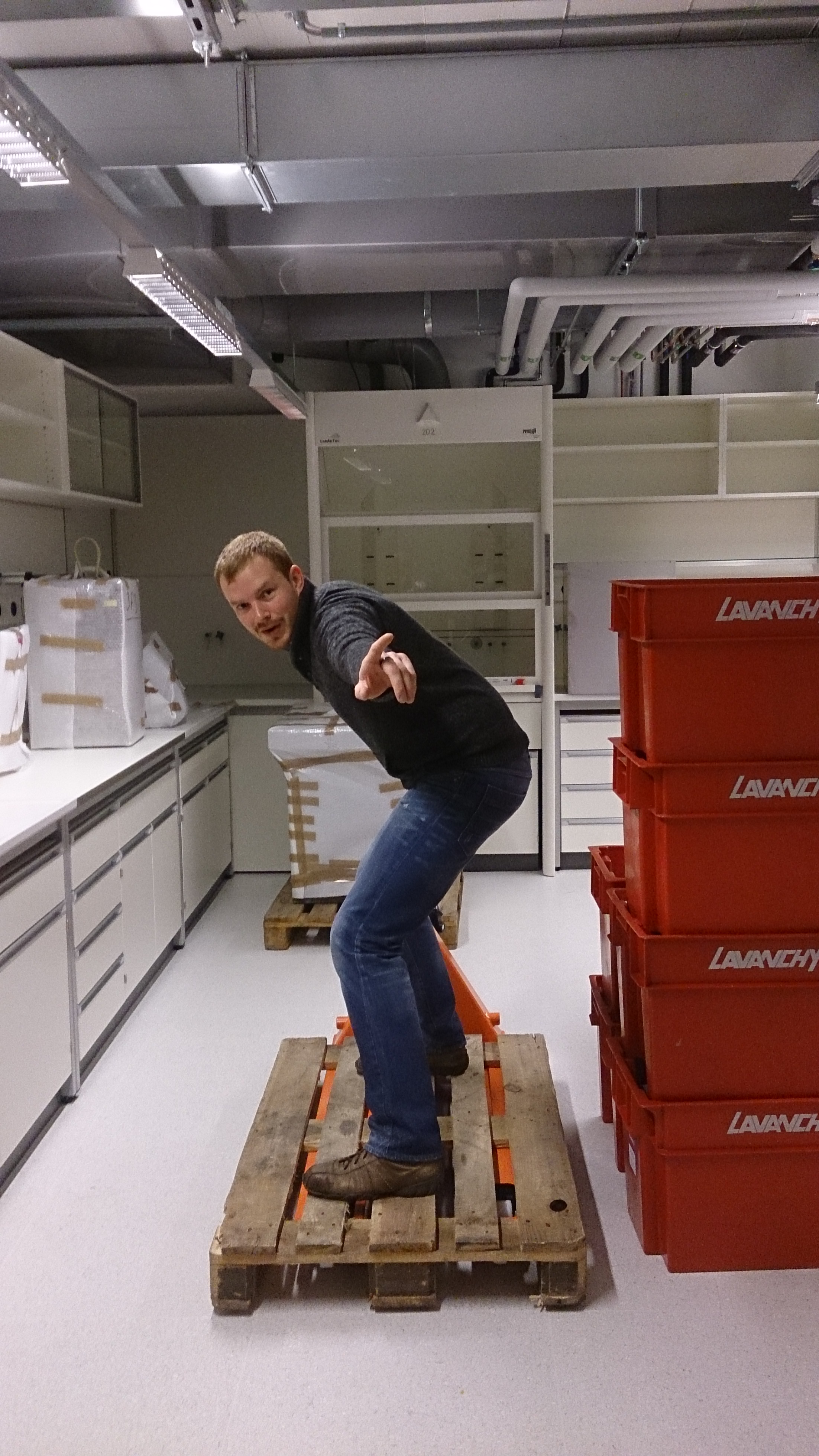
Go! Moving from Lausanne to a new campus in Zion in April 2015
"Candidate minimum" in Swiss
At the end of the first year of study, each graduate student, or rather a candidate for graduate students, is waiting for a proficiency test. Before this wonderful moment, graduate students are often mandraged, although cases where someone was expelled can be counted on the fingers. This is due to the fact that candidates pass through several stages of filtration:
- formal when applying to school
- personal interview and presentation
- social, when, before the final decision on admission, a professor or a group leader asks his employees if they like the person, whether he will join the team.
If someone is expelled, then it is done for formal and objective reasons, for example, regular and gross violation of the rules of TB or very bad scientific results.
So you shouldn’t be afraid of the first-year exam, because on the whole, the exam is much easier than in the Russian Federation, where you have to pass philosophy, English, specialty and write a bunch of reports on the work done.
There are several formal criteria for accessing the exam (may vary from school to school):
- 3-4 ECTS credits from 12 or 16 are closed (more on this below), depending on the program / school. In my case, it was EDCH - a doctoral school in chemistry and chemical technology.
- Prepared a written report on the work done and plans for the future. Someone needs a brief 5 pages, someone thinks that you need to write a mini-review of the literature.
- A commission of 2-3 professors (often internal) is chosen.
All movements are recorded in the electronic accounting system (below), the report is loaded there as well as the names and surnames of professors. The minimum of bureaucracy and the almost complete absence of paper consumption (literally a couple of forms must be completed and signed). Although, a cursory survey showed that EPFL is highly heterogeneous inside and, for example, in the EDBB (school of biology and biotechnology), the electronic system is used differently.
On the exam before the commission, which includes the supervisor, you must tell the presentation and answer the questions. Sometimes they are really philosophical, however, no one will torture them with “questions from a textbook,” such as writing such a formula or making the iron-carbon state diagram with all austenitic and martensitic transformations drawn.
Iron-Carbon Chart
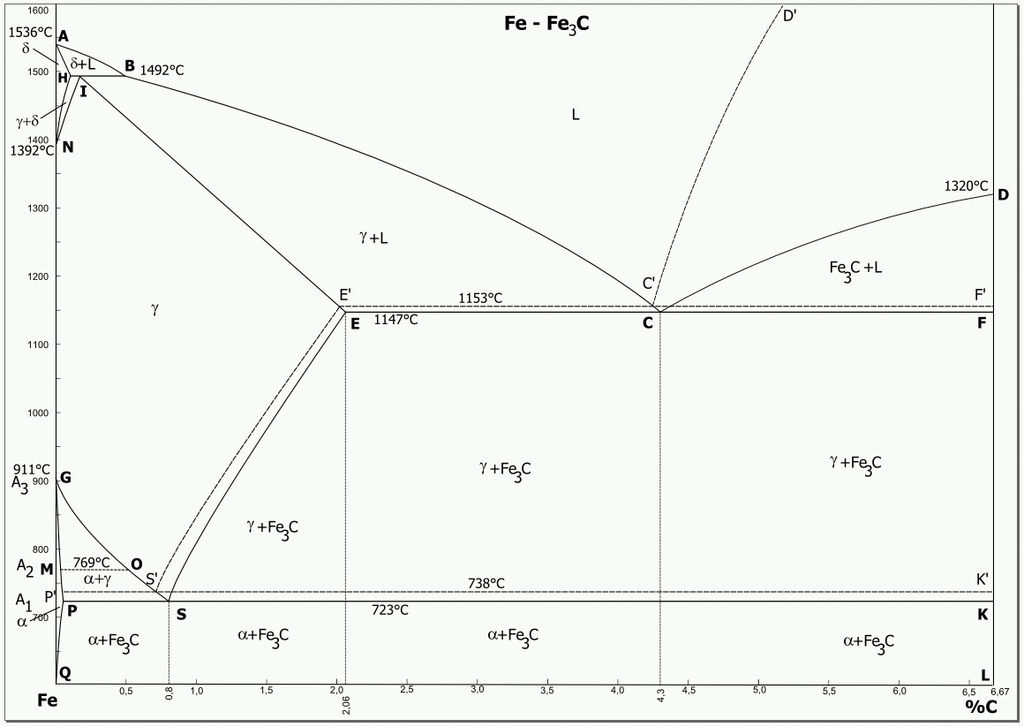
By the way, the diagram for memorizing is not easy. A source
It is believed that the candidate will find this information somewhere in a textbook or reference book, but the ability to think, evaluate facts and make correct conclusions - unfortunately, this is not the case in books.
European loans (ECTS): what is it and what does it eat with?
If you thought that I would write about financial loans, then I would disappoint. ECTS is a pan-European system of accounting and recalculation of time spent on learning a particular subject. The number of hours for obtaining one loan varies slightly, but is generally standardized - about 15 hours per ECTS. The EPFL is considered the norm of 14-16 hours per ECTS, which roughly corresponds to a half-semester course of 2 academic hours per week.
E-book courses
In the course e-book ( course book ), which is different for each school, it looks like this: on the right, the value of the course in credits, the total number of hours and the schedule:

However, there are some courses where in 30 hours they will give only 1 credit.

However, there are some courses where in 30 hours they will give only 1 credit.
As of 2013, the following rule was in effect: for the masters it was necessary to collect 12 credits for the entire period of study in graduate school, whereas for specialists it was 16. It was justified by the fact that the specialist’s program is shorter, and therefore it is necessary to get this difference in half a year.
Life hacking and buns
The system has several lifehacks and buns:
NB: Often participation in conferences and summer / winter schools can be sponsored by the EPFL itself. To do this, you must fill out a form and write a motivation letter from the supervisor. The money received is enough, for example, to pay for travel, which is not bad.
- Each year, you can get 1 ECTS for attending the conference, subject to the availability of a report (poster or presentation is not important). This can be done 2-3 times for the whole graduate school, respectively, -20-25% of the load.
- You can take a course at another university, not EPFL or visit the winter / summer schools. Provide one (!) Single paper, which will indicate the equivalent of the time spent in credits, and fill out a special form. Everything, nothing more is required of the student, other issues are decided between responsible people.
NB: Often participation in conferences and summer / winter schools can be sponsored by the EPFL itself. To do this, you must fill out a form and write a motivation letter from the supervisor. The money received is enough, for example, to pay for travel, which is not bad.
Ultimately, at the end of the graduate school in the diploma supplement, all courses and conferences will be listed separately:
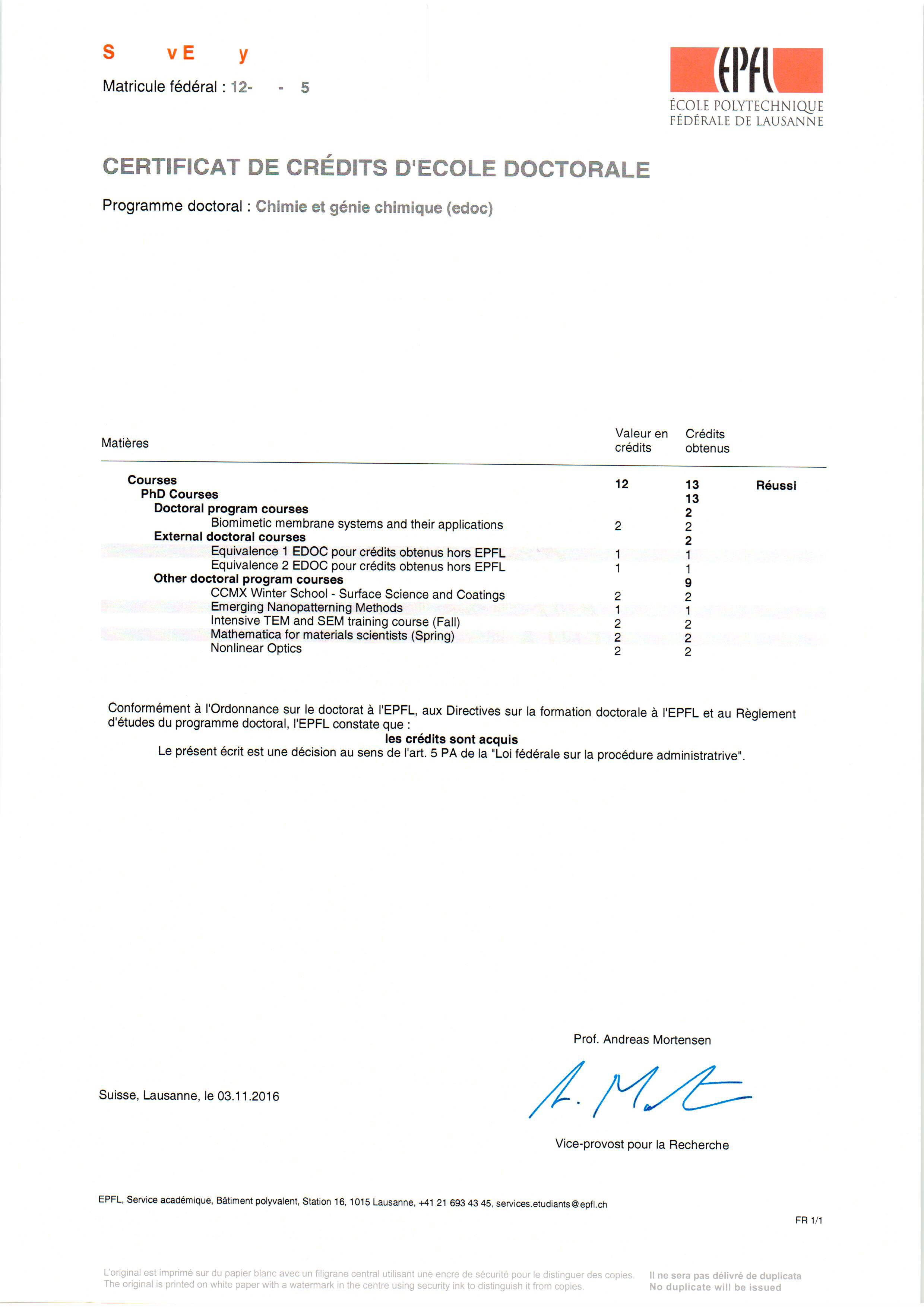
Bureaucracy
Fortunately, the whole bureaucracy is hidden inside the system. This is especially true of standard questions and procedures such as filling out travel reports and more. Therefore, in ~ 95% of cases, the employee does not encounter filling out papers and forms, but only enters his data into the system, receives a pdf file for printing, which he signs and sends further on instance - swiss precision. Of course, this does not apply to "special" cases when there is no standard instruction - everything can drag on for a very long time, like everywhere else, in fact.
Business trips: Switzerland vs Russia
In the EPFL, on return from a business trip, all checks, travel, etc. hem and give up. Naturally, the report is sent in paper form, but it is still duplicated and stored in the SESAME system in electronic form. Usually, the secretary himself (a) contributes all the expenses to the system according to the submitted report, at the same time verifying all the expenses, and then asks to sign one piece of paper for reimbursement of expenses that will be generated within the system. I think in a couple of years everyone will have an electronic signature and the whole procedure will be completely electronic.
Any small expenses of 2-5-10 francs can be made to the report without checks (on the word of honor, yes). In addition, common sense always acts: if a person travels from A to B, but has lost a ticket, for example, he will be reimbursed anyway. Or, for example, at the London airports, the device "eats" the exit ticket, then the usual photo of the ticket will do. And finally, if the tickets and the hotel are ordered through a laboratory credit card (and there is such a thing!) Or through a special bureau, then no report is required to provide any report, they are already tied to the trip code inside SESAME.
Now, how are things in Russia. Once I was invited to one beautiful city beyond the Urals (we will not disclose all the details) to give a lecture on its scientific topics. By a lucky coincidence, at that moment I was in Moscow, I could jump on a plane with a small suitcase in advance and reach a destination in a couple of hours. After the scientific seminar, I was asked to sign a “contract for the free provision of services,” several statements, and I had to send the back of my boarding pass for the return flight in an envelope.
Any small expenses of 2-5-10 francs can be made to the report without checks (on the word of honor, yes). In addition, common sense always acts: if a person travels from A to B, but has lost a ticket, for example, he will be reimbursed anyway. Or, for example, at the London airports, the device "eats" the exit ticket, then the usual photo of the ticket will do. And finally, if the tickets and the hotel are ordered through a laboratory credit card (and there is such a thing!) Or through a special bureau, then no report is required to provide any report, they are already tied to the trip code inside SESAME.
Now, how are things in Russia. Once I was invited to one beautiful city beyond the Urals (we will not disclose all the details) to give a lecture on its scientific topics. By a lucky coincidence, at that moment I was in Moscow, I could jump on a plane with a small suitcase in advance and reach a destination in a couple of hours. After the scientific seminar, I was asked to sign a “contract for the free provision of services,” several statements, and I had to send the back of my boarding pass for the return flight in an envelope.
Visual comparison of the Russian and Swiss systems
Once upon a time I received a grant from the RFBR for a trip to the conference in Rhodes (I wrote about this in the first part ), after which I was forced to translate all the checks into Russian.
One of my colleagues in a dangerous business brought checks from Israel, where part of the amounts were in euros, and the other in shekels. All checks in Hebrew, of course. However, for some reason it did not occur to anyone to force him to translate from Hebrew, they simply believed in the word where the currency was. Why should I steal from myself, from my own grants, right ?!
Yes, there is a field for abuse, but usually it is all nipped in the bud when it comes to large amounts, rather than spending 200-300 euros at conferences.
One of my colleagues in a dangerous business brought checks from Israel, where part of the amounts were in euros, and the other in shekels. All checks in Hebrew, of course. However, for some reason it did not occur to anyone to force him to translate from Hebrew, they simply believed in the word where the currency was. Why should I steal from myself, from my own grants, right ?!
Yes, there is a field for abuse, but usually it is all nipped in the bud when it comes to large amounts, rather than spending 200-300 euros at conferences.
Publishing articles and writing grants
An important indicator of the effectiveness and "coolness" of a scientist is his hirsch index (h-index) . It shows how well the works of a particular author are cited, correlating the number of articles and their “quality” (number of citations).
In Russia, they are now struggling to increase the Hirsch index among researchers and improve the quality of journals (in other words, the impact factor or IF, impact factor), where these works are published. The method is simple: let's pay a premium for a good article. One can argue a lot about this management decision, however, unfortunately, they do not solve two main problems: the underfunding of Russian science, as a whole, and the “collective farm” of the authors, when they include those who were directly related to the work and those who sat next to.
Strangely enough, there are practically no additional payments for articles in the EPFL, it is believed that the scientist himself will be published if he wants to achieve something, and if he does not, then please come to the exit. Of course, if the contract is permanent, then it will be difficult to complete it due to the lack of publications, but usually by this moment the professor will be accredited by teaching, various committees and administrative work. For example, the position of dean is elective, there is a term of occupation of this position in several years.
My vision for solving this problem
All impact factors of journals are known and are publicly available. It is necessary to establish a clear conversion factor from IF to rubles, say 10k per 1 IF unit. Then the publication in a relatively good journal Nanoscale (IF = 7.233) will cost 72.33k rubles per team of authors. And Nature / Science up to 500k rubles. And it is better to differentiate 5k for 1 IF unit in large cities and federal research centers and 10k in new (up to 5-7 years) and regional centers.
Then, such a publication supplement should not be paid to every author, but to the whole team of authors, so that there is no desire to include left-wing people in the publication. That is, if it is a “collective farm” of 10 people, then everyone will receive 7k, and if it is 3-4 people actually involved in the project, then ~ 20-25k each. Scientists will have a transparent economic incentive to write in good journals, straighten out the English language (for example, ordering proofreading of articles) and not include “consultants”.
Total: a researcher will be able to receive at the level of a professor or even a director of an institute doing his favorite work. A fork of opportunities will appear: vertical (career ladder) or horizontal (more different projects and topics, more graduate students and students, more money earned) development.
Then, such a publication supplement should not be paid to every author, but to the whole team of authors, so that there is no desire to include left-wing people in the publication. That is, if it is a “collective farm” of 10 people, then everyone will receive 7k, and if it is 3-4 people actually involved in the project, then ~ 20-25k each. Scientists will have a transparent economic incentive to write in good journals, straighten out the English language (for example, ordering proofreading of articles) and not include “consultants”.
Total: a researcher will be able to receive at the level of a professor or even a director of an institute doing his favorite work. A fork of opportunities will appear: vertical (career ladder) or horizontal (more different projects and topics, more graduate students and students, more money earned) development.
In general, there is nothing difficult in the publication of an article, if it is qualitatively executed and it is assumed that it will be of interest to the public. In my chemical experience, I will say that the first 3-4 articles in serious journals are rather difficult, because some factors were not taken into account in its preparation (general style, presentation of important and unimportant results, a ready list of reviewers, including with which aspects of work discussed at conferences and meetings, etc.). But then they start to fly out, like hot cakes from the stove. Especially if the topic is in the world top, and the last in the list of authors is a well-known and authoritative professor.
The following dilemma also arises: a top world-renowned professor (aka large corporations), when attention to their work must be literally scraped bit by bit, or the group leader with a large and ambitious project (aka start-up), where you can have the greatest incentive to develop and multitasking experience.
Although physicists and biologists, for example, obtaining results suitable for an article can take up to several years, therefore 1-2 publications per doctorate are considered the norm.
However, I have to disappoint the romantics of science: as elsewhere, it’s often for the publication in a high-rating journal that it’s not the quality of the work itself that is being answered, but of meeting the right people. Yes, the very cronyism, with which they try to fight, but human nature is difficult to fix. Even in the EPFL itself, there is one elderly professor, under whose name sometimes rather muddy works are published in good journals. But this is a big topic for a separate article, where everything is intertwined: public relations, the desire of magazines to make money and the ambition of the authors.
And, of course, a similar situation with grants. The first few applications may fail, but then the grant writing activity rises on the conveyor. Although, formally, graduate students are not required to engage in grants, nevertheless, it is possible to participate in the process.
I don’t know how now with applications for the Russian Science Foundation ( RNF ), but 7 years ago an application for a grant in the Russian Federation actually required a wad of paper, as well as a report. Applications and reports for the Swiss National Science Foundation ( SNSF ) rarely exceed 30–40 pages. It is necessary to write briefly and succinctly to save resources and time of other participants in the process, reviewers.
There are no specific plans for the articles, but by and large, my professor said: “ If you publish 1 article per year, I have no questions for you. If two, then great! "But this is chemistry, about the physicists and lyricists said above.
And finally, the publication of articles slowly crawls toward open access (aka open access) when the author himself or the author pays for a scientific foundation, instead of the usual model, when the reader pays. In the EU, a directive has been adopted that calls for all ERC-funded research to be published soon in the public domain. This is the first trend, and another trend is video articles, for example, for 3-4 years there has been JoVE - Journal of Visualized Experiments, and not a successful blogger. This journal also contributes to the dissemination of knowledge about scientific discoveries in a simple and understandable form.
SciComm and PR
And once the word PR has sounded above, then in modern science there is a simple rule: you should advertise your achievements and achievements as much as possible - PR. Write articles for popular science portals, write review articles for scientific journals, prepare materials on the same Youtube, LinkedIn, Twitter, Facebook and VK. Use maximum social networks. Why do you need it? The answer is simple: first, no one except the author of original research can better describe his ideas and the results achieved, and secondly, this is a banal transparency of science to taxpayers. In the West, they love it very much!

More information about the article can be found here *
* LinkedIn - an organization banned in the Russian Federation
Scientific PR as it is
One of my acquaintances, an Irishman through Twitter, is almost the same as the ERC and national grants wins, because Twitter has an S & T council account, which keeps track of where and what is happening, where there are notorious “points of growth”.

In addition, various contests aimed at a short and capacious narration about science are gaining popularity. For example, FameLab , organized by the British consul, “Ma these a 180 seconds” , Science Slam in Russia, “Dance your PhD” , held 11 times under the auspices of the journal Science ( in 2016, the winner was a Russian , for example), and many many other. For example, one of the nearest events will be held at the XX Sol-Gel Conference , where students can take part absolutely free!
In the same FameLab, a mini-school is organized at the weekend for those who have passed the preliminary selection, where they tell how to communicate information, how to start and finish the story, and by and large the same pitch. At one time I participated in such a school, which was organized and held at CERN itself. It is unusual to feel yourself on the surface of the most grandiose scientific structure and realize that somewhere down below the protons are flying at almost the speed of light through a tube of 27 kilometers. Impressive!
For many people, science is the door to a new world! Often, brilliant scientists simply do not know how, shy or afraid to speak to the public, but it is such contests that allow them to break down barriers and overpower themselves. So, one my biologist friend, having made his way to the final stage of the FameLab, became a scicomm evangelist. It seems to me that for him this was a rather sharp turn in his career. See for yourself:
Or here’s Radmila’s talk about uranium complexes in the last week’s competition “Ma these a 180 seconds”:
About mentoring
No matter how polite everyone is and they show respect for each other, conflicts often occur, and the interests of the boss (professors or leader groups) disagree with the wishes and aspirations of the employee (graduate student or postdoc). EPFL, as a conglomeration of tens of thousands of people, is also subject to these processes. To help graduate students in the first few years of their stay at the university, in 2013 a mandatory institute of mentoring was introduced.
What does mentoring aka mentoring mean for a graduate student?
First , the scientific and technical expertise of the ideas of a graduate student. In principle, a mentor should receive the same reports and research plans 1-2 times a year, like the professor and the supervisor of the graduate student.
Secondly , a mentor is an arbitrator in disputes between a graduate student and a professor. If the professor, for whatever reasons, rejects the proposals and ideas of the graduate student, then the mentor is weighing all the arguments of the two parties and trying to resolve the conflict.
Here it is worth making a reservation that, in the EPFL, despite all the efforts of the administration, there are professors who have squeezed out the last juice from undergraduate and graduate students — sometimes even scandals happen. In this case, the mentor can support the student, help to contact the administration of a particular school. This is an important aspect of training, because for many graduate students, a transfer to another laboratory or a decision to stop studying in graduate school is almost a personal failure on a global scale, so they are willing to tolerate almost everything to prevent this from happening. However, in the EPFL you should not be afraid of this, as there are a variety of solutions to problems and employees, especially administrative staff, are always ready to help, because this directly affects the image of the university.
Third , a mentor can help with career advice and networking. The mentor also help with tips and contacts for a future doctor's career.
By the way, while this article was being prepared, I made a video for the Mentors Club MSU about what EPTL mentoring is. Anyone can contact me through this club here .
Teaching practice: hell or heaven?
Each graduate student, signing a contract, undertakes to spend 20% of the working time on teaching assistance. This may be, as the holding of seminars with the analysis of tasks, and work in the laboratory with students (workshop).
Here I can’t write for everyone, perhaps, to someone, it is a practice, and it is a pleasure, but my experience was not very positive. Of course, it depends on how you relate to this: you can do it on “from # $ @ & Camp”, or you can try to tell and show students something, try to put together different sections of chemistry with leading questions.
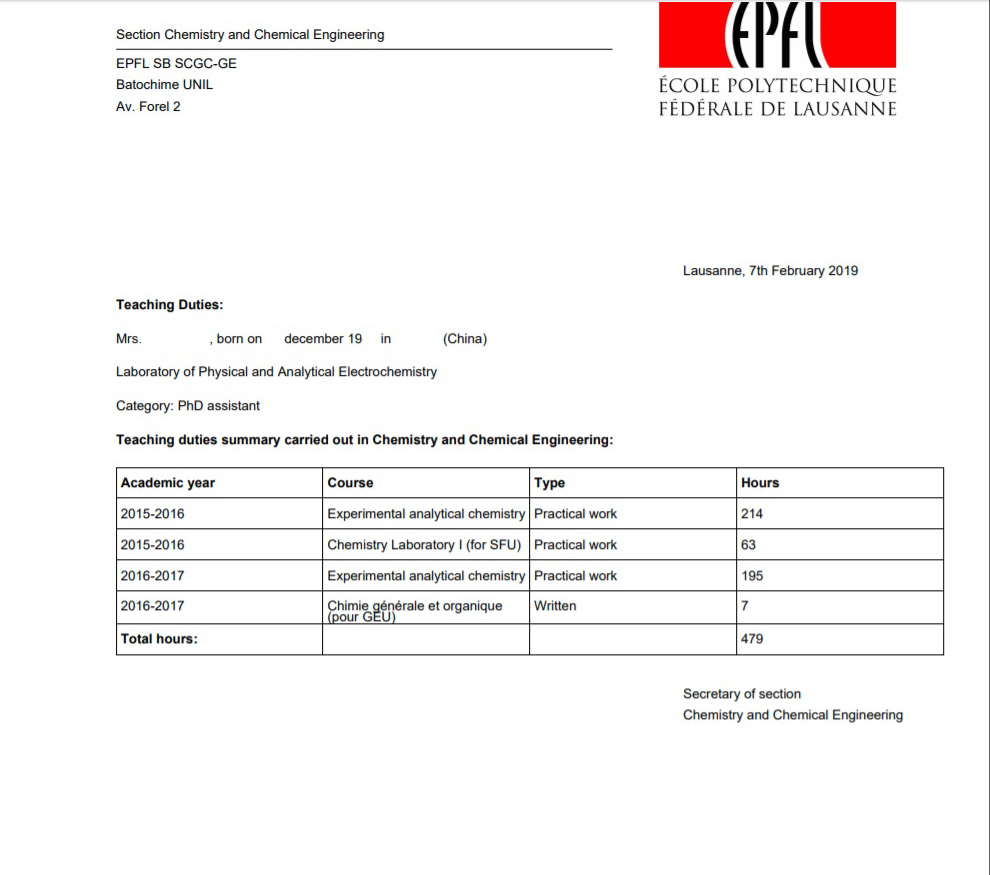
How teaching practice looks like inside the ISA system
For two years I have been practicing IR spectroscopy and fluorescence spectroscopy (two semesters). After 200 students, I can say that only 10 percent of the workshops were treated with due respect. interest and did everything neatly and on time. Unfortunately, the proportion of the indigenous, Swiss population among such “geeks” is vanishingly small.
Requiem for the workshop
The first workshop on IC was quite childish. Usually the group left in an hour, sometimes 1.5, instead of the set 3. Everything is simple: he told the theory, showed how to work with the device and voila "kids" measured 5 samples (for each minute, two) and went home to count, search for information and prepare report. A week later, they bring a report, I check it, give a rating. However, there were brilliant individuals who were too lazy to write and draw up a report. There were those who were too lazy to simply search for the IR spectra of the most common polymers. They saw them and touched their hands (!), That is, it is simply impossible to guess, since 4 out of 5 are PET, PVC, Teflon and PE, one sample is aspirin powder (yes, you have to tinker here). There were those who could not answer fairly simple questions from the series: “but how to polymerize a monomer?” Once, 5 people stood at the blackboard, trying to recall the stages of the radical polymerization reaction that they took literally last semester, and why they often use it chlorine - do not remember ...
Another workshop was on fluorescence spectroscopy: how much quinone in Schweppes. The task of analytical chemistry to build a calibration curve and the determination of the unknown concentration. We did this at SUNZ in the 11th grade. So, bachelor students do this task poorly, they don’t follow the numbers, they don’t know the statistics, although I had practical experience with analytical methods and statistics with processing the results. Some even can not prepare a sample and standard solutions ... in the 3rd year of the bachelor's degree, yes. Is it any wonder after this that Swiss graduate students are an endangered species ?!
And as a cherry on the cake, the unspoken rule: below 4 out of 6 can not be set, otherwise the student is obliged to retake, which is not necessary for any student or teacher.
Another workshop was on fluorescence spectroscopy: how much quinone in Schweppes. The task of analytical chemistry to build a calibration curve and the determination of the unknown concentration. We did this at SUNZ in the 11th grade. So, bachelor students do this task poorly, they don’t follow the numbers, they don’t know the statistics, although I had practical experience with analytical methods and statistics with processing the results. Some even can not prepare a sample and standard solutions ... in the 3rd year of the bachelor's degree, yes. Is it any wonder after this that Swiss graduate students are an endangered species ?!
And as a cherry on the cake, the unspoken rule: below 4 out of 6 can not be set, otherwise the student is obliged to retake, which is not necessary for any student or teacher.
Yes, you shouldn't forget for a minute that not only the teacher assesses the student, but the student at the end of each course gives marks to the teacher.The saddest thing is that these assessments of students are taken too seriously - perhaps it will not work before the teacher is dismissed, but it is quite possible to get a ban on teaching. A professor is not exactly a professor, if he does not have 1-2 courses for students, that is, knowledge replication. When it works in the direction of promotion and additional bonuses for the teacher, it’s good, but when it becomes a means of revenge and scoring, then the rules “not less than 4 out of 6” are obtained, and the estimates are too high, and the monosyllabic issues at the test stages are just behind. quality of teaching is falling.
Instructive story about students and teachers
EPFL . – , , , . – . , , ( , ): « . , , EPFL. … » «», , . , — .
For the sake of fairness, it is worth adding that in EPFL there is a bonus system when the best teacher in the opinion of students can receive a promotion of 1000 CHF per semester.
But in all Swiss universities, there is a tough system: if you couldn’t learn to become a chemist from the first attempt, flew out in the middle of training, then you’re not eligible to enter this specialty in any universities throughout the country if you leave for the EU.
Completion of postgraduate studies: dissertation writing and defense (s)
And now, having gone through all the circles of hell, having received the required number of credits, and having completed the required number of hours with students, one can think about defending a thesis.
In the EPFL, as in many European universities, there are two schemes for defending a thesis: “shortened” and ordinary. If there are 3 or more published articles, then you can go on a shortened scheme. That is, write a brief general introduction, attach these articles, since each will be regarded as a separate chapter of the thesis, and write a general conclusion. There are fewer works than in the usual version, but there are also fewer buns. For example, short dissertations do not take on the Springer Nature Theses Prize., and also on special awards of the relevant school for outstanding dissertations (usually, the commission on closed defense votes for this)
Accordingly, the time of writing is different: a shortened one can be made out in a month or two, and you should start writing a full one at least 3-4 months before the defense, and preferably half a year.
Then comes the process of protection, which is divided into two stages: private protection and public. At the same time, 35 days before the private defense, it is necessary to download the text of the thesis and pay for the exam and the diploma in the amount of 1,200 francs.
Closed (private) protection is a kind of analogue of our defense in the departments when only commission members (professors from other Swiss universities and universities of other countries gather - at least 2 out of 3). They assess quality, scientific value, prepare tricky questions, and so on. In general, the defense is held gently, the professors communicate with the future doctor on an equal footing. There is no need to memorize any factual material or formulas, you can always refer to the page of the written thesis. As in the case of the first year exam, the ability to think, reflect, and process new inputs is more likely to be evaluated when there is already some kind of conclusion drawn.
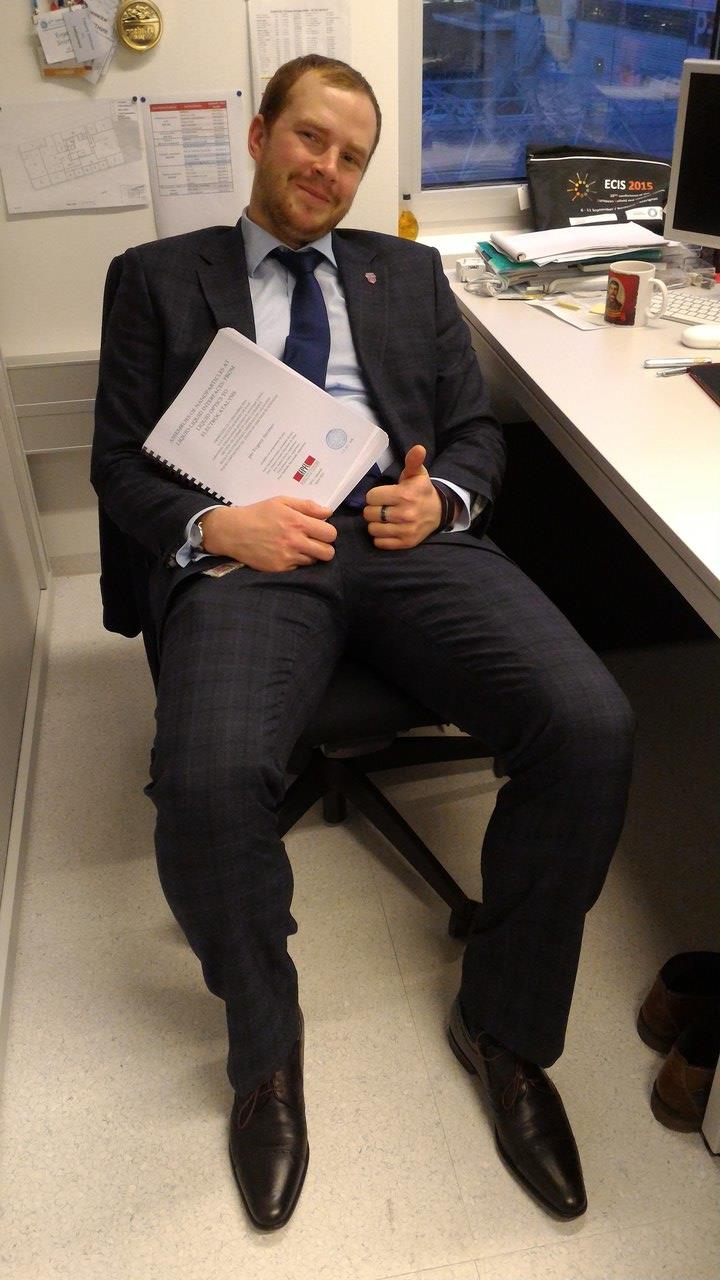
The relaxed state after protection, and the beginning to darken outside the window ...
The whole process is automated, the system itself will tell you when to submit the document, who to ask for help, and so on. And since 2018, the entire document flow is conducted in electronic form. If earlier it was necessary to print out and bring four (each professor + one to the archive) stitched copies of the thesis, now all communication is conducted online, and works for review are sent by email. Plus, this allows for a mandatory plagiarism check from 2018.
Swiss Customs Fun
. , , . , , , . , , , , , . email - .
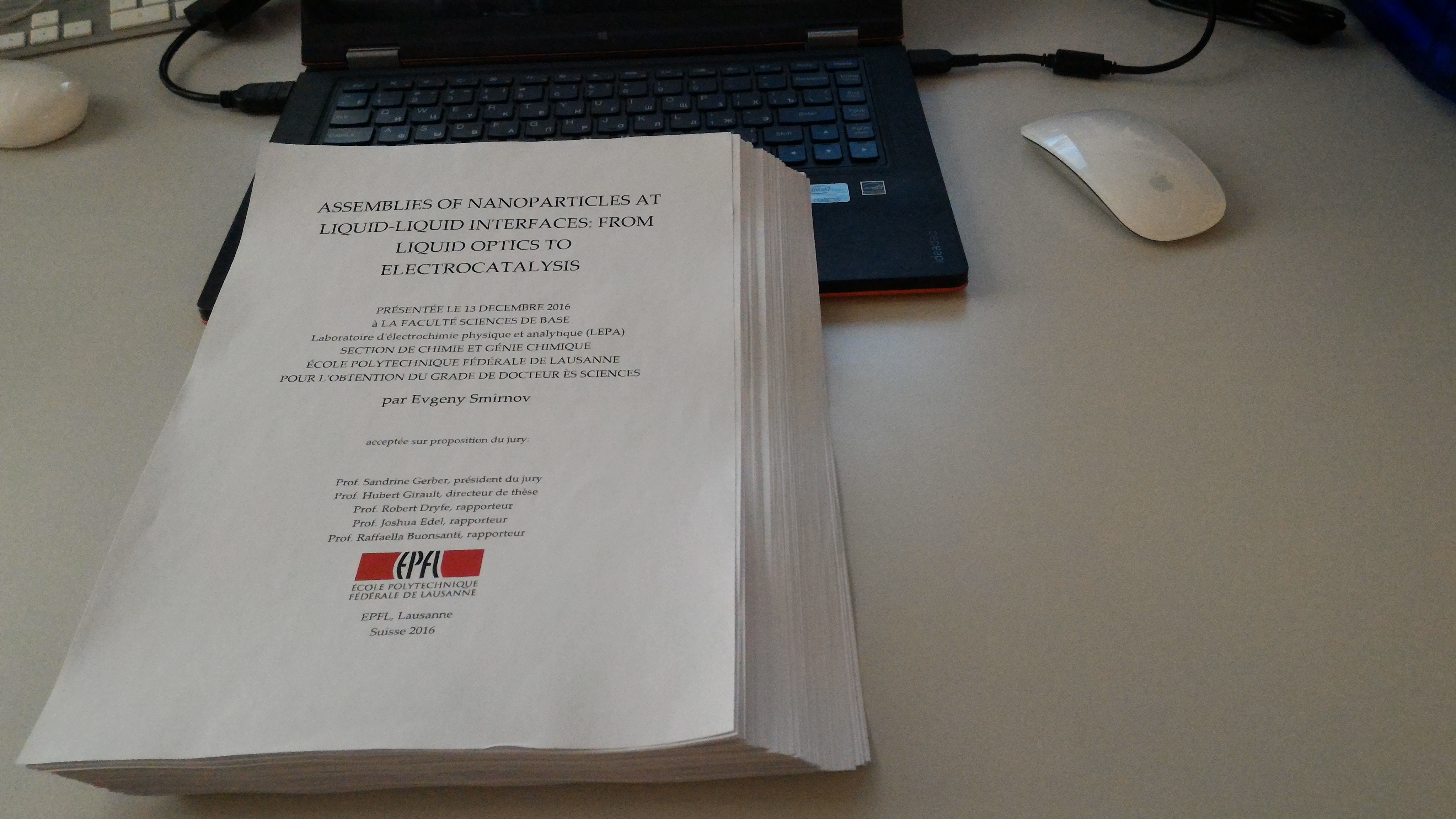

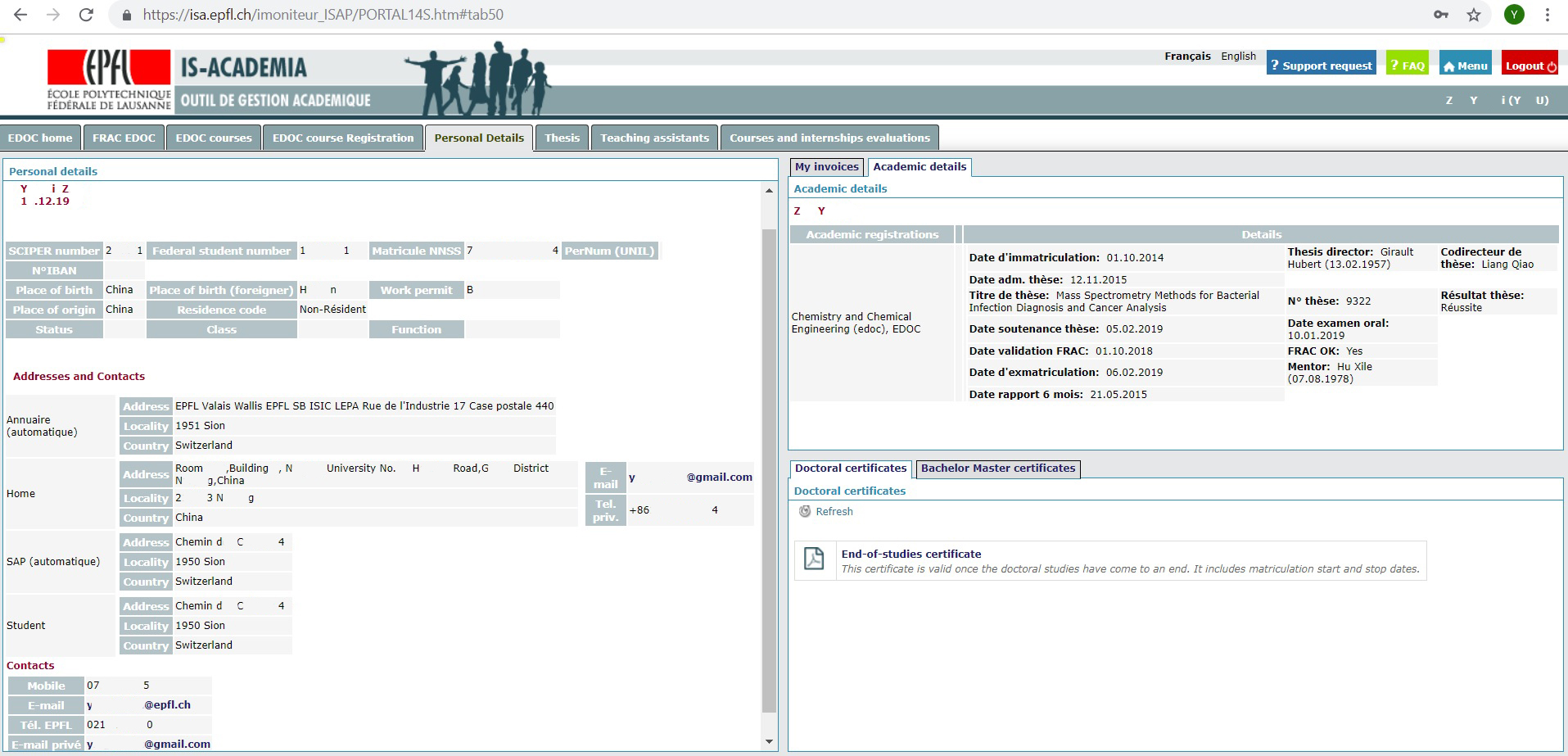
The graduate student card inside the ISA system contains almost all the data and within this system all this data is stored, updated and supplemented.
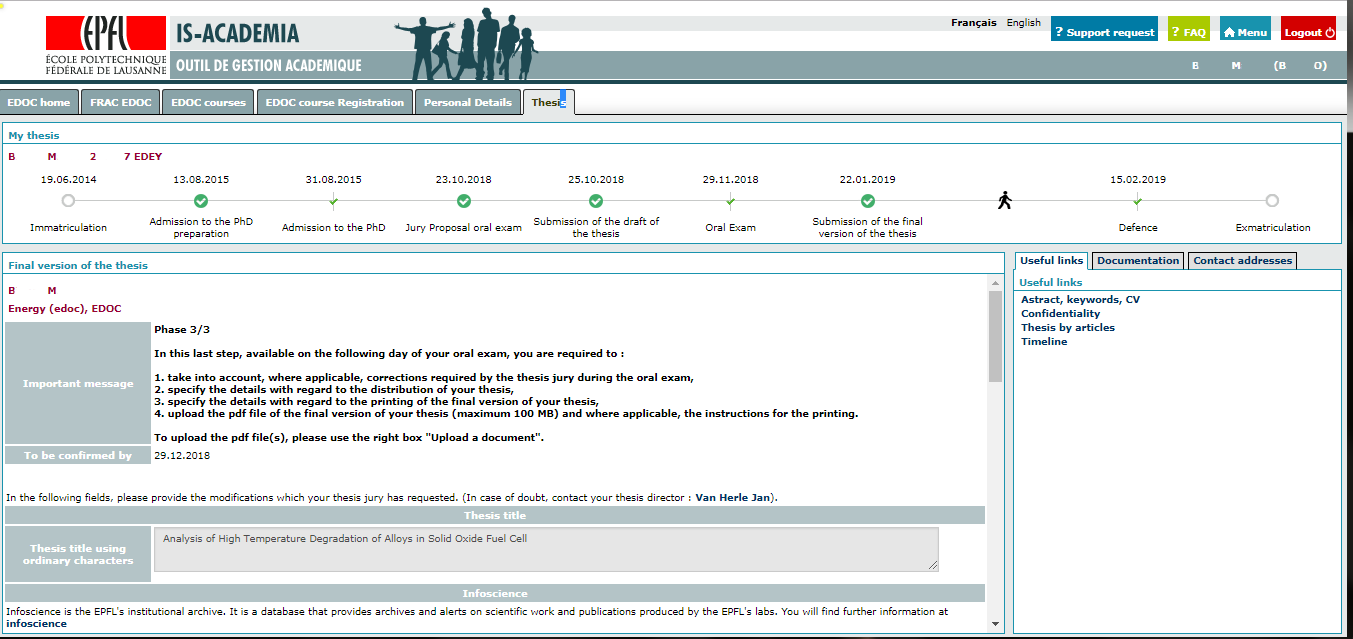
This is the life course of the graduate student inside the ISA: Run, Forest, run!

In order to finally put a bold green tick at the end
And now, all the stages are completed, the work is written and adjusted after the questions and the answer to the privat-protection. The candidate goes to the public defense, in which it is necessary to explain his science as simply as possible, since anyone can visit it, including not necessarily an EPFL employee. This is how full transparency of science and taxpayer spending is organized. Some protection really come people "from the street."
And only after public defense (yes, it may seem that this is just a formality, but this is so) the candidate receives a diploma and a Ph.D. degree (PhD, Doctor of Philosophy ).

It so happened that in the confusion they completely forgot about the photographer ...
And the most pleasant part of public defense is a small, and sometimes a very large buffet, again for all those present.

My doctor's champagne ...

Which must be immediately floated!
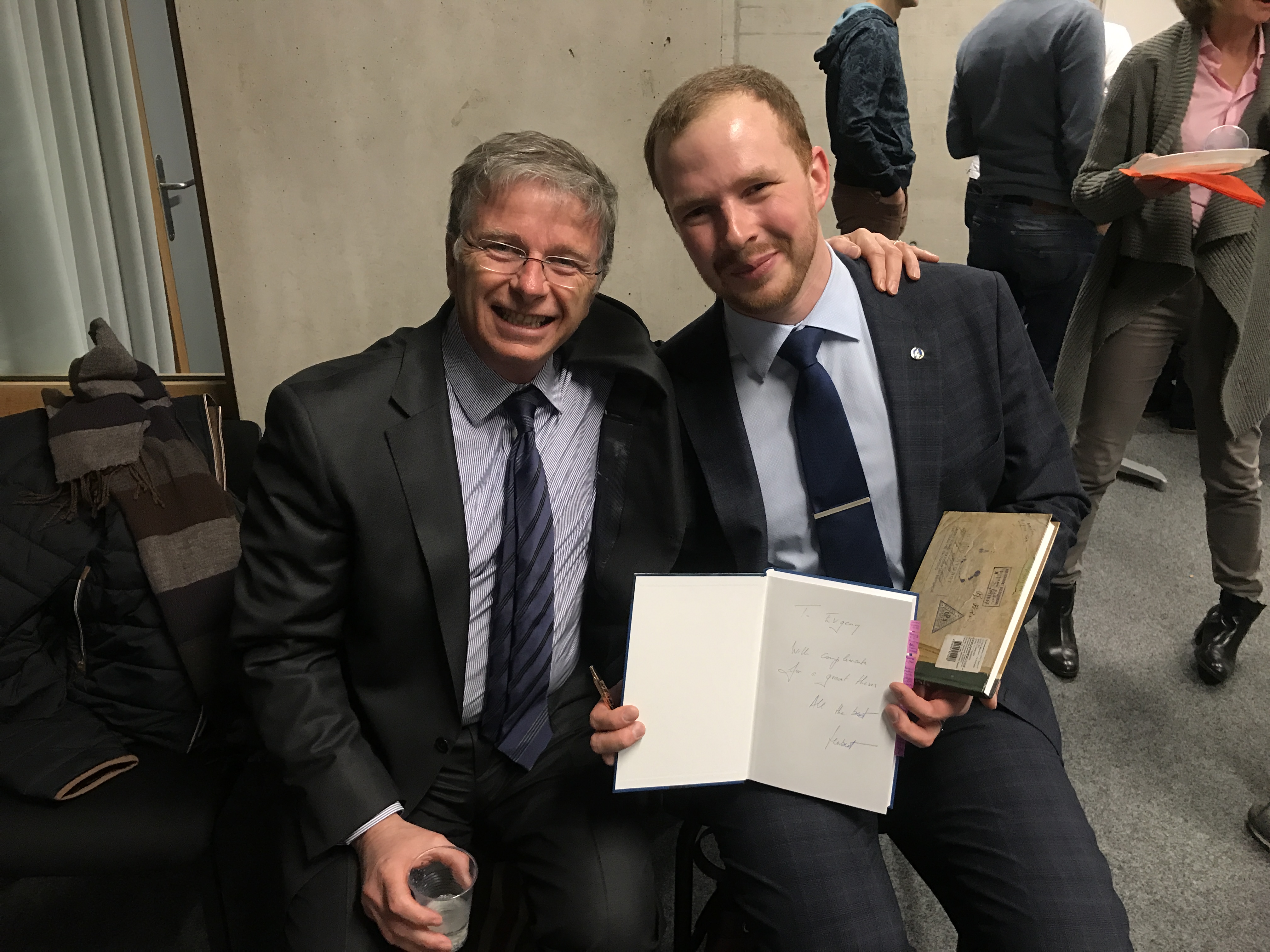
And a memory photo in an informal setting.
Yes, I almost forgot, EPFL has its own printing house, where theses are printed. Depending on when the final version of the thesis is uploaded, the printed version of it is born in a beautiful cover right before public defense or slightly later:

It looks like a printed copy of a diploma, a couple of pieces can be taken with you.
Recognition of a degree in the Russian Federation and apostil
The degree obtained in the EPFL, until recently, required confirmation in the Russian Federation, but since 2016 this is not required, according to the order of the Government of the Russian Federation of April 5 , 2016 N 582-p .
Now I know that you just need to certify the signature in the EPFL, and then put an apostille in the administration of Lausanne ( Prefecture de Lausanne ), which takes a maximum of a couple of hours. Make a copy of an apostilled diploma and just give it to a translation to any translation bureau in the Russian Federation.
The tale of how the ministry does not want to delve into your message
Is there life after PhD?
At some point, before every freshly baked PhD the question arises: is there life after the PhD? What to do next: stay in an academic environment or try to get a private company?
Below is a slightly simplified diagram of how I saw this situation.
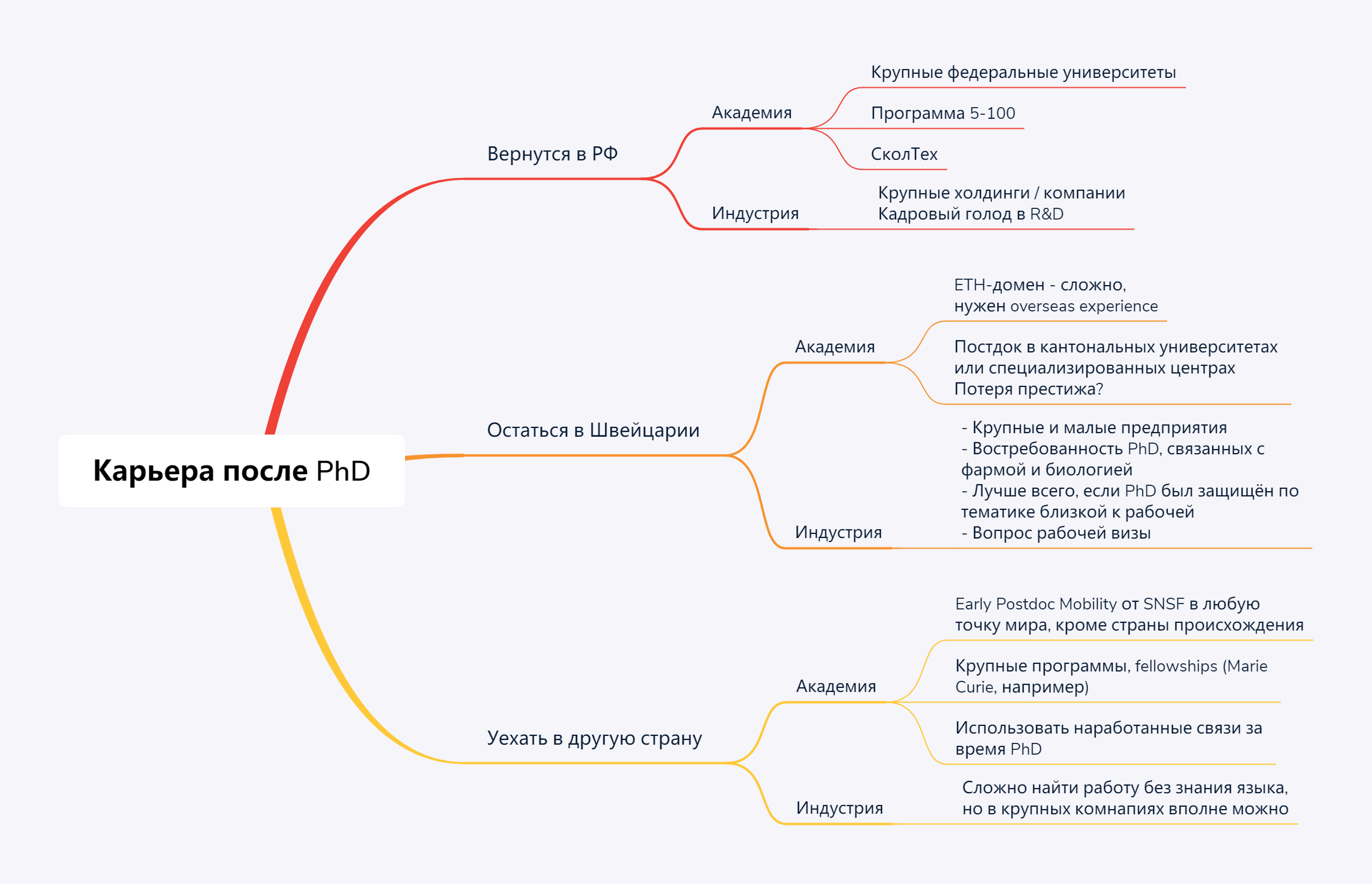
Possible career paths after obtaining a PhD
Firstly , there is always the option to return to Russia. Unfortunately, there is almost no R & D in Russia (I’m talking about chemistry and physics mostly), there are some pockets of resistance, such as start-ups for developing equipment for tomography, oil and gas-chemical holdings that want to sell not only oil in barrels, but the production of high redistribution, start small-scale production of chemicals. But that's all. It remains an academic environment, which recently began to pump means not only point to buy equipment, but also in terms of wages. These are the program 5-100 , and various programs aimed at foreign cooperation, the notorious SkolTech, and “fatty” grants of the Russian Science Foundation, comprehensive programs of support for young scientists . But the problem remains: after a quarter of a century of total oblivion, so many talented young scientists have washed away from the scientific community that now it will not be a simple task to fill in the problems. At the same time, all sound initiatives are buried under an array of bureaucracy and drafting papers.
Secondly , you can always move from Switzerland to the neighboring EU countries, the USA, etc. The diploma is quoted, and the Swiss Science Foundation can add more money using the Early Post-doc Mobility program. And the salary will be slightly higher than the average for the country where you plan to leave. In general, in Europe and not only love the various programs of mobility of young scientists, so that they visit here, there are typed really international experience and different approaches, tied ties. The same program of Marie Curie fellowship is aimed specifically at intensifying international interaction. On the other hand, for 4 years, it is possible to build up a package of contacts in the scientific community (they worked with someone, drank beer somewhere at the conference, and so on), who would be invited to a postdoc or a researcher’s position.
If we talk about industrial positions, then they are full of them in neighboring France, Germany, Benelux, and so on. Major players such as BASF, ABB, L'Oreal, Melexis, DuPont and others are massively buying talented people in the market with a degree and help them move and settle in a new country. In the EU, a very simple and convenient system, the salary exceeds ~ 56k euros per year - that's your “ Blaue Karte ”, just work and pay taxes.
Thirdly , you can try to stay in Switzerland itself. After receiving a diploma, starting from the date of its issuance, any student has half a year to search for work within the country. There are pros and cons, their own nuances, but more on that another time. Many companies do not want to bother with hiring foreign employees mainly because of the visa issue, so getting an industry position for a PhD can be called a great success. Although, if you learn one of the official languages (German or French, preferably) to the conversational level B1 / B2 and receive an official certificate, then the chances of employment increase, even if you don’t say a word at work later. A minute of chauvinism and nationalism. In addition, this certificate will be required for submission to the permanent permit.
And, of course, you can stay in Switzerland, working in research centers and universities, since, in principle, the post-doctoral salary allows you to live in family trouble. In this case, people will look askance, since mobility is considered the norm, but it is quite possible to remain in your group for a year to finish what has been started, or to go for a year with a postdoc on an interesting project. It all depends on the specific situation and the desires of the employee.
Instead of conclusion
This story about graduate school and study in Switzerland can be considered complete. In the following sections I would like to talk about everyday life, domestic issues in this country, to show its pros and cons. Write in the comments questions of interest to this part (I will try to answer them in as much detail as possible), as well as to the next, as this will help me structure the material.
PS: defended his dissertation on January 25, 2017 and remained on a postdoc in the same group. During this time, another five works were completed and written, including a monograph (book) on the results of the thesis. And in January 2019 he went to work at a startup engaged in the production of solar panels.
PPS: I would also like to note and thank for the comments and observations of those who helped with the writing of this article: Albert aka qbertych , Anya, Ivan, Misha, Kostya, Slava.
And finally, the bonus is two videos about EPFL ...
... and separately about the campus in Mount Zion, which deals with projects in the field of energy:
Do not forget to subscribe to the blog : You are not difficult - I am pleased! And yes, about the defects noted in the text, please write in the LAN.
Source: https://habr.com/ru/post/443360/
All Articles